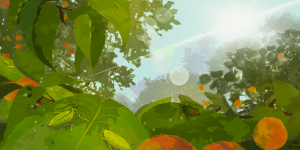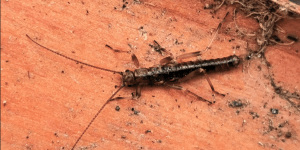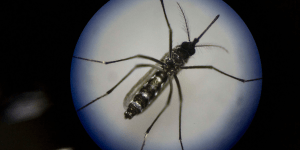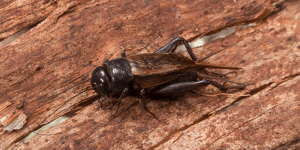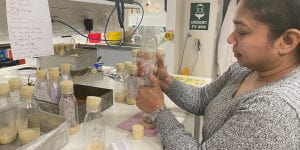pearg
-
Breaking Bad bugs: Testing potential biocontrol agents for pesticide tolerance
I have a passion for playing mad scientist with pesticides, all in the name of making agricultural pest control safer and more sustainable. If you’re fond of growing roses, you’re probably familiar with the frustrating critters that invade them in your garden. The critters, in this case aphids, are unfortunately fond of your roses, along […] -
Are you a mosquito magnet? Here’s why and what you can do about it
Dr Perran Stott-Ross and Holly Hyojung Kang This article was first published on Pursuit. Read the original article. Mosquitoes are some of the most effective hunters on the planet. They can track you down at great distance by sniffing out the air you breathe. Once they find exposed skin, they use their needle-like proboscises to […] -
Evolutionary Adaptation to Climate Change | EcolClips Ary Hoffmann interview
-
When your dream comes true…
By Miriama Pekľanská As my stay comes to an end, I would like to share a few words about myself and how I fulfilled my dream of coming to Australia to complete my three-month PhD internship with the Pest & Environmental Adaptation Research Group (PEARG). I am from a little village near the beautiful city […]blogs.unimelb.edu.au/pearg/2024/03/21/when-your-dream-comes-true
-
Victoria’s new habitat law fails to protect a tiny endangered species
By Eddie Tsyrlin and Ary Hoffmann This article was first published on Pursuit. Read the original article. Australia’s unique and diverse wildlife is a source of national pride and global fascination. But this reputation is marred by our country’s alarming rate of species extinction. Australia has already earned the dubious title of the world leader […] -
Scientists and government agencies are targeting mosquitoes with bacteria
by Nancy Endersby-Harshman and Ary Hoffmann This article was first published on Pursuit. Read the original article Dengue fever is one of the most common tropical diseases in the world, affecting several million people every year. It is transmitted by mosquitoes, particularly a species known as Aedes aegypti, the yellow fever mosquito. Dengue is a […] -
Do you have a chorus of crickets in your backyard? Here’s why
by Ary Hoffmann This article was first published on Pursuit. Read the original article. From Reservoir to Fitzroy, social media has been abuzz that parts of Melbourne are being overrun by crickets. The native Australian insect may be small, but it can make a whole lot of noise – something your ears might be recovering […]blogs.unimelb.edu.au/pearg/2024/03/13/do-you-have-a-chorus-of-crickets-in-your-backyard-heres-why
-
The breeding trap targeting Melbourne’s growing mozzie problem
Véronique Paris, Liam Ferguson, Nicholas Bell and Ary Hoffmann Banner: Marianne Coquilleau Mosquito-borne diseases like dengue and Japanese encephalitis may feel like far-distant nightmares for many Victorians. Here, the warmer summer months coinciding with the mosquito season are more synonymous with backyard BBQs and backyard cricket than the smell of tropical strength repellents and mosquito […]blogs.unimelb.edu.au/pearg/2024/02/01/the-breeding-trap-targeting-melbournes-growing-mozzie-problem
-
My exciting two weeks with PEARG
By Aiswarya Sankar I was so excited when my nomination for a work integrated learning at the Pest & Environmental Adaptation Research Group (PEARG) was accepted. I had never been to a work integrated learning before and as a Diploma in Lab Techniques student at RMIT, it was a fantastic opportunity for me to spend […]blogs.unimelb.edu.au/pearg/2023/07/12/my-exciting-two-weeks-with-pearg
-
Novel solutions for pest management
Curious about the progress in managing insect pests in Australian grain crops? Don’t miss the GRDC’s latest podcast episode to catch up on the headway made by the Australian Grains Pest Innovation Program, as Associate Professor Paul Umina provides an update on the ground breaking research currently underway. Tune in here. It’s estimated the Australian grains […]blogs.unimelb.edu.au/pearg/2023/04/20/novel-solutions-for-pest-management
Number of posts found: 112
